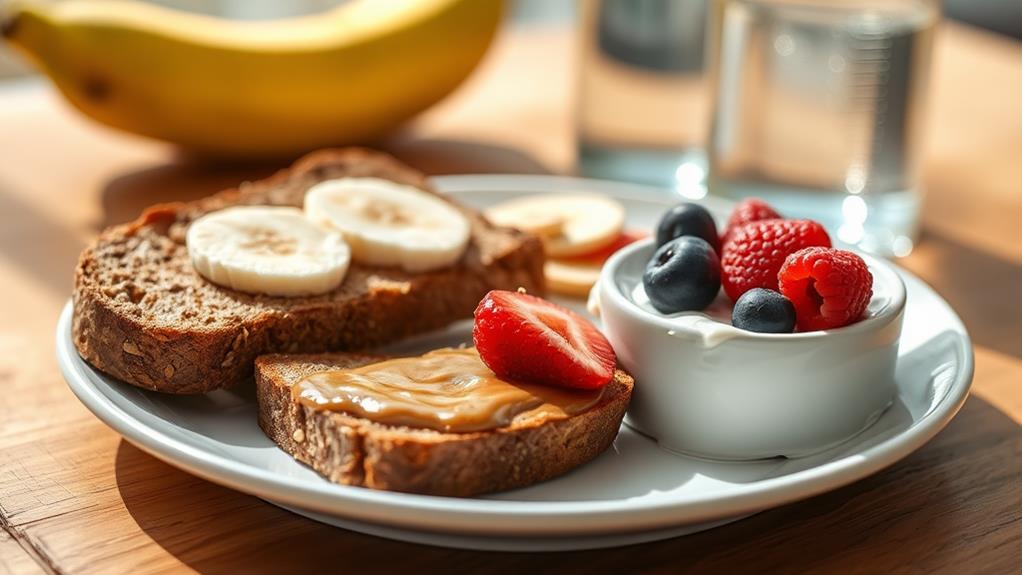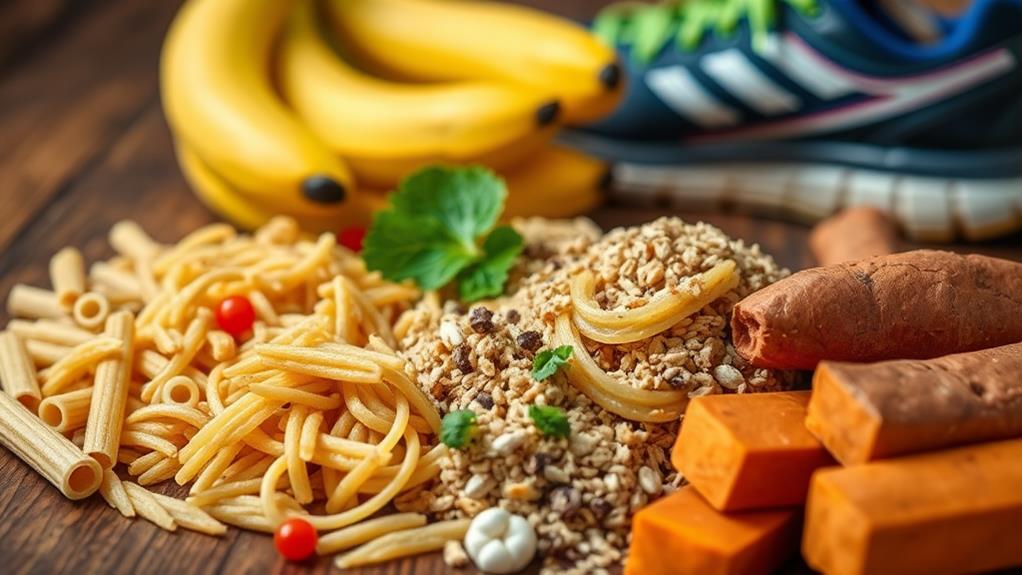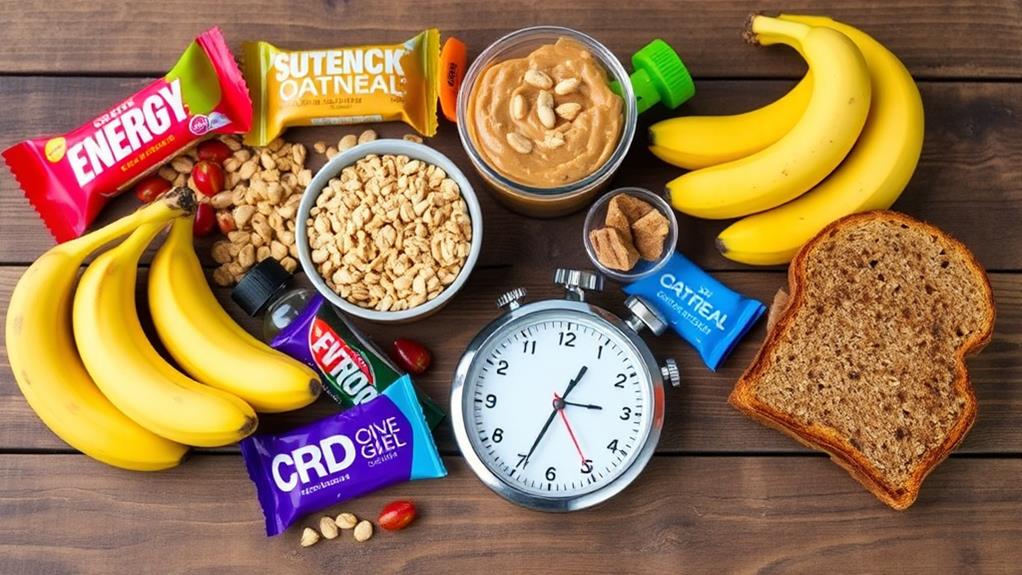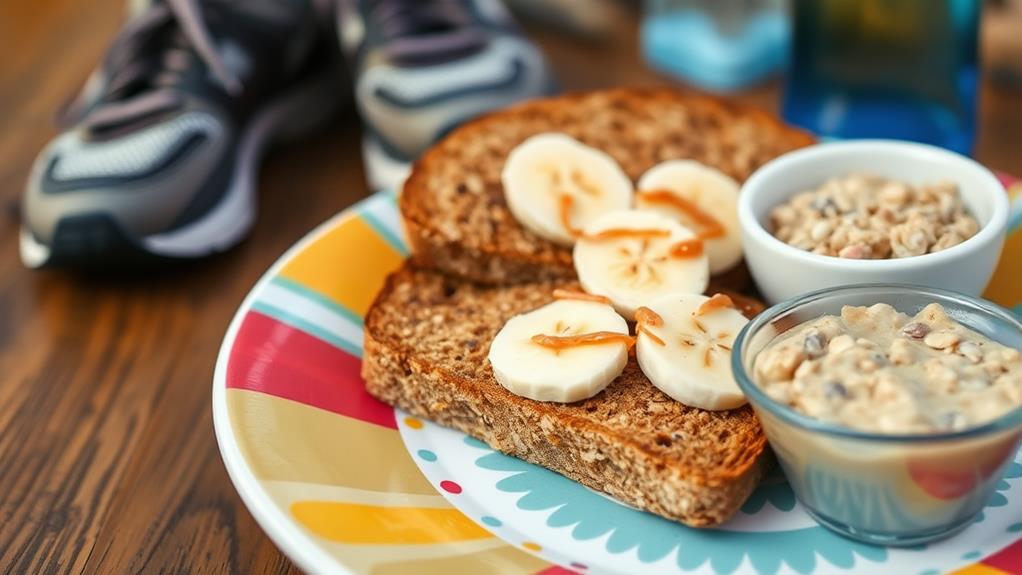To optimize your running performance, focus on pre-run nutrition that’s rich in complex carbohydrates and moderate in protein. Time your meals according to your run: eat larger meals 3-4 hours before, medium meals 2-3 hours prior, or light snacks 30-60 minutes before running. Opt for easily digestible foods like whole grain toast with peanut butter, Greek yogurt with berries, or a banana. Stay hydrated by drinking water consistently and consuming 16 ounces two hours before your run. Tailor your nutrition to your run’s duration and intensity. Avoid high-fiber or fatty foods close to run time to prevent digestive issues. By understanding these basics, you’ll be well-equipped to fuel your runs effectively.
Understanding Pre-Run Nutrition Basics

Nearly every runner knows that proper nutrition before a run is essential. But understanding the basics of pre-run nutrition can help you optimize your performance and avoid discomfort during your workout. The key lies in achieving the right macronutrient balance and meal composition. Glycogen stores play an important role in providing energy during runs, making carbohydrate management critical for runners.
Your pre-run meal should primarily consist of easily digestible carbohydrates, which provide quick energy for your muscles. Aim for a meal that’s about 70% carbs, 20% protein, and 10% fat. This balance helps fuel your run without overwhelming your digestive system. Complex carbohydrates like whole grains, fruits, and vegetables are excellent choices, as they release energy steadily.
The timing of your pre-run meal is significant. Eat a larger meal 3-4 hours before your run, or a smaller snack 1-2 hours prior. This allows for proper digestion and prevents stomach issues during your workout. Hydration is equally important; drink water consistently throughout the day and about 16 ounces two hours before your run. By mastering these nutrition basics, you’ll set yourself up for a more enjoyable and effective running experience.
Timing Your Pre-Run Meals
Three key factors determine the ideal timing of your pre-run meals: the size of your meal, your individual digestion rate, and the intensity of your planned run. To optimize your performance, you’ll need to take these factors into account when planning your meal frequency and food preferences.
For larger meals, you’ll want to allow 3-4 hours before your run to facilitate proper digestion. Smaller snacks can be consumed 1-2 hours prior. However, everyone’s digestion rate differs, so it is crucial to experiment and find what works best for you. High-intensity runs require more time for digestion to avoid discomfort during exercise.
Take note of these pre-run meal timing guidelines:
- Large meal (600-800 calories): 3-4 hours before running
- Medium meal (400-500 calories): 2-3 hours before running
- Small meal (200-300 calories): 1-2 hours before running
- Light snack (100-200 calories): 30-60 minutes before running
Carbohydrates: The Runner’s Fuel

Carbohydrates are essential for runners, providing the primary source of energy for your muscles during exercise. You’ll want to focus on complex carbohydrates, which release energy slowly, rather than simple carbs that can cause rapid spikes and crashes in blood sugar. Glycogen stores act as the main energy reserve during long runs, making carbohydrate intake vital for peak performance and preventing the dreaded “hitting the wall” phenomenon. Timing your carbohydrate intake is vital: aim to consume a balanced meal containing complex carbs 2-3 hours before your run, or opt for a small, simple carb snack 30-60 minutes prior if you’re short on time.
Complex vs. Simple Carbs
When choosing carbs for your pre-run meal, it’s vital to understand the difference between complex and simple carbohydrates. Complex carbs, found in foods like whole grains and starchy vegetables, are composed of longer chains of sugar molecules. These complex starches take longer to digest, providing a steady release of energy and helping maintain stable glucose levels throughout your run. On the other hand, simple carbs, or simple sugars, are found in foods like fruits and processed snacks. They’re digested quickly, leading to rapid energy release and potentially causing blood sugar spikes. While carbohydrates are fundamental for runners, it’s significant to recognize that protein intake also plays a considerable role in overall performance and recovery.
Consider these factors when selecting pre-run carbs:
- Digestion speed: Complex carbs digest slowly, while simple sugars are absorbed rapidly
- Energy release: Complex carbs provide sustained energy, simple sugars offer quick bursts
- Nutrient absorption: Complex carbs often contain more fiber and nutrients
- Performance impact: Complex carbs support endurance, simple sugars can cause energy crashes
For peak performance, focus on consuming primarily complex carbohydrates before your run. However, incorporating a small amount of simple sugars can provide an initial energy boost. This balanced approach guarantees steady energy levels and sustained performance throughout your run.
Timing Carbohydrate Intake
Proper timing of carbohydrate intake is vital for maximizing your running performance. Carb timing plays an essential role in maintaining steady energy levels throughout your run. You’ll want to consume complex carbohydrates 2-3 hours before your run to guarantee proper digestion and sustained energy release. This pre-run meal should consist of foods like whole grain pasta, brown rice, or oatmeal.
For shorter runs or when you’re pressed for time, opt for easily digestible simple carbs 30-60 minutes before your run. A banana, energy bar, or sports drink can provide a quick energy boost without causing digestive discomfort. During longer runs lasting over 90 minutes, you’ll need to replenish your carbohydrate stores. Consider consuming energy gels, sports drinks, or easily portable snacks every 45-60 minutes to maintain your energy levels. Post-run, it’s important to refuel within 30 minutes to aid recovery. Choose a combination of carbohydrates and protein to replenish glycogen stores and support muscle repair. By strategically timing your carbohydrate intake, you’ll guarantee ideal energy levels and enhance your running performance.
Protein’s Role in Pre-Run Nutrition
While carbohydrates are essential for your pre-run energy, protein also plays a significant role in your pre-run nutrition. You’ll want to include some protein in your pre-run meal or snack to help prepare your muscles for recovery and enhance your overall endurance. Additionally, protein can contribute to a feeling of satiety, potentially helping you maintain a steady energy level throughout your run.
Muscle Recovery Preparation
Protein’s role in pre-run nutrition often gets overlooked, but it’s vital for muscle recovery preparation. When you consume protein before a run, you’re setting the stage for efficient muscle repair post-exercise. Nutrient timing plays a significant role here, as your body can start utilizing these proteins during your run, minimizing muscle breakdown and jumpstarting the recovery process.
To prepare your muscles for ideal recovery, consider incorporating these protein-rich pre-run snacks:
- Greek yogurt topped with sliced almonds and berries
- Whole grain toast with peanut butter and banana slices
- Hard-boiled egg with a small apple
- Protein smoothie made with milk, spinach, and frozen fruit
Satiety and Endurance Benefits
Beyond muscle recovery, protein plays an essential role in enhancing satiety and endurance during your run. When you consume protein-rich foods before exercise, you’re activating satiety signals that help control hunger and maintain energy levels throughout your workout. This can be particularly beneficial for longer runs or endurance events where sustained energy is vital.
Incorporating protein into your pre-run meal or snack is one of the most effective endurance strategies you can employ. It helps stabilize blood sugar levels, preventing sudden drops in energy that can lead to fatigue. Additionally, protein supports the maintenance of lean muscle mass during extended periods of exercise, which is essential for maintaining proper form and preventing injury.
To maximize these benefits, aim to consume a moderate amount of protein about 1-2 hours before your run. This timing allows for proper digestion and absorption, ensuring the nutrients are available when you need them most. Consider options like Greek yogurt with berries, a turkey sandwich on whole-grain bread, or a smoothie with protein powder to fuel your run effectively.
Hydration Strategies Before Running

Runners know that proper hydration is essential for performance and safety. Before lacing up your shoes, it’s vital to evaluate your hydration strategy. Your body’s hydration needs depend on factors like weather conditions, run duration, and individual sweat rates. Focus on maintaining proper electrolyte balance by including various hydration sources in your pre-run routine.
To effectively hydrate before a run, follow these guidelines:
- Sip water consistently throughout the day, visualizing a steady stream of clear, invigorating liquid nourishing your body.
- Consume electrolyte-rich beverages 2-3 hours before your run, imagining the colorful ions replenishing your cells.
- Eat water-rich fruits like juicy watermelon or crisp cucumber slices an hour before running.
- Take a final gulp of water 15 minutes prior to starting, picturing it as fuel for your impending journey.
Quick Pre-Run Snack Ideas
When it comes to fueling up for a run, quick and easily digestible snacks are essential. You’ll want to focus on options that provide a balanced mix of carbohydrates and proteins to energize your body without causing digestive discomfort. Energy bars are a convenient choice, offering a compact source of nutrients. Alternatively, you can whip up fruit smoothies, blending your favorite fruits with yogurt or plant-based milk for a revitalizing pre-run boost.
For those who prefer solid foods, yogurt parfaits layered with granola and berries offer a delightful combination of textures and flavors. Spreading nut butter on rice cakes or whole-grain toast provides a satisfying blend of carbs and healthy fats. If you have a sweet tooth, oatmeal cookies or banana pancakes can serve as tasty, energy-packed options. For longer runs, consider preparing a custom trail mix with nuts, dried fruits, and a sprinkle of dark chocolate chips. Remember to consume these snacks about 30-60 minutes before your run to allow for proper digestion and ideal energy release during your workout.
Full Meal Options for Runners

While quick snacks are great for immediate pre-run fuel, full meals play an essential role in a runner’s overall nutrition strategy. When planning your meal prep, focus on nutrient balance to guarantee you’re getting the right mix of carbohydrates, proteins, and healthy fats. Aim to consume your pre-run meal 2-3 hours before your run to allow for proper digestion.
Here are four balanced meal options that’ll fuel your runs:
- Whole grain pasta with lean ground turkey, tomato sauce, and steamed vegetables
- Grilled chicken breast with quinoa and roasted sweet potatoes
- Baked salmon with brown rice and sautéed spinach
- Vegetarian chili with mixed beans, diced tomatoes, and a side of cornbread
These meals provide a good balance of complex carbohydrates for sustained energy, lean proteins for muscle repair, and vegetables for essential vitamins and minerals. Don’t forget to stay hydrated by drinking water with your meal. By incorporating these full meal options into your routine, you’ll set yourself up for success on your runs and support your overall training goals.
Avoiding Common Pre-Run Nutrition Mistakes
Even with the best intentions, you might be sabotaging your run before it begins. Common pitfalls in pre-run nutrition can greatly impact your performance and enjoyment. To avoid these mistakes, focus on maintaining proper nutrient balance and energy levels through careful meal composition and food choices.
One frequent error is consuming too much fiber or fat shortly before running, which can lead to digestive issues and discomfort. Instead, opt for easily digestible carbohydrates and moderate protein. Another mistake is not considering individual preferences and tolerances. What works for one runner may not suit another, so it’s essential to experiment and find what agrees with your body.
Don’t overlook the importance of timing. Eating too close to your run can cause cramping, while waiting too long may leave you feeling depleted. Aim to eat a substantial meal 2-3 hours before running, or a lighter snack 30-60 minutes prior. Finally, be mindful of psychological factors. Stressing over perfect pre-run nutrition can negatively affect your performance. Strike a balance between informed choices and flexibility to guarantee you’re fueled and ready to run.
Tailoring Nutrition to Run Duration

The duration of your run greatly impacts your nutritional needs. As you prepare for runs of varying lengths, it’s essential to tailor your pre-run nutrition to support your energy requirements and maintain digestive comfort. For shorter runs, you’ll need less fuel, while longer distances demand more substantial pre-run meals. Consider your individual preferences and adjust meal composition accordingly.
When tailoring your nutrition to run duration, keep these points in mind:
- 30-minute run: A small snack like a banana or energy gel
- 60-minute run: Light meal with carbs and protein, such as toast with peanut butter
- 90-minute run: Balanced meal with complex carbs, lean protein, and healthy fats
- 2+ hour run: Larger meal with increased carbohydrates and moderate protein
For training runs, experiment with different meal timings and portion sizes to find what works best for you. On race day, stick to familiar foods and meals you’ve tested during training. Remember that nutritional balance is key, regardless of run duration. Adjust your pre-run nutrition based on the intensity and length of your planned activity to optimize performance and maintain energy levels throughout your run.

